Asrar-e-Khudi /The Secrets of the Self
Today I am going to introduce you to a book which can change your thinking.It was, of course, an excellent book of all the time۔
Asrar-i-Khudi (Persian:The Secrets of the Self; published in Persian, 1915) was the first philosophical poetry book of Allama Iqbal, the great poet-philosopher of British India. This book deals mainly with the individual, while his second book Rumuz-i-Bekhudi discusses the interaction between the individual and society.
Considered by many to be Iqbal's best book of poetry, it is concerned with the philosophy of religion. In a letter to the poet Ghulam Qadir Girami (d.1345/1927), Iqbal wrote that "the ideas behind the verses had never been expressed before either in the East or in the West." R.A. Nicholson, who translated the Asrar as The Secrets of the Self, says it caught the attention of young Muslims as soon as it was printed. Iqbal wrote this in Persian because he felt the language was well-suited for the expression of these ideas.
Topics
- Introduction
- Prologue
- Showing that the system of the universe originates in the Self, and that the continuation of the life of all individuals depends on strengthening the Self
- Showing that the life of the Self comes from forming desires and bringing them to birth
- Showing that the Self is strengthened by Love
- Showing that the Self is weakened by asking
- Showing that when the Self is strengthened by Love its gains dominion over the outward and inward forces of the universe
- A tale of which the moral is that negation of the Self is a doctrine invented by the subject races of mankind in order that by this means they may sap and weaken the character of their roles
- To the effect that Plato, whose thought has deeply influenced the mysticism and literature of Islam, followed the sheep's doctrine, and that we must be on our guard against his theories
- Concerning the true nature of poetry and the reform of Islamic literature
- Showing that the education of the self has three stages : Obedience, Self-control, and Divine Vicegerence
- Setting forth the inner meanings of the names of Ali
- Story of a young man of Merv who came to the saint Ali Hujwiri – God have mercy on him and complained that he was oppressed by the enemies
- Story of the bird that was faint with thirst
- Story of the diamond and the coal
- Story of the Sheikh and the Brahmin, followed by a conversation between Ganges and Himalayas to the effect that the continuation of social life depends on firm attachment to the characteristic traditions of the community
- Showing that the purpose of the Muslims 's like is to exalt the Word of Allah, and that the Jihad(to strive or to struggle), if it be prompted by land-hunger, is unlawful in the religion of Islam
- Precepts written for the Muslims of India by Mir Naj«t Nakshbandi. Who is generally known as Baba Sahr'ai
- Time is a sword
- An invocation
Editions
Nicholson, Reynold A. (tr. from original in Persian ) (1920). Secrets of the Self (Asrar-i khudi) – A philosophical poem by Sheikh Muhammad Iqbal Macmillan & Co. London
http://archive.org/stream/secretsofselfasr00iqbauoft#page/n5/mode/2up.
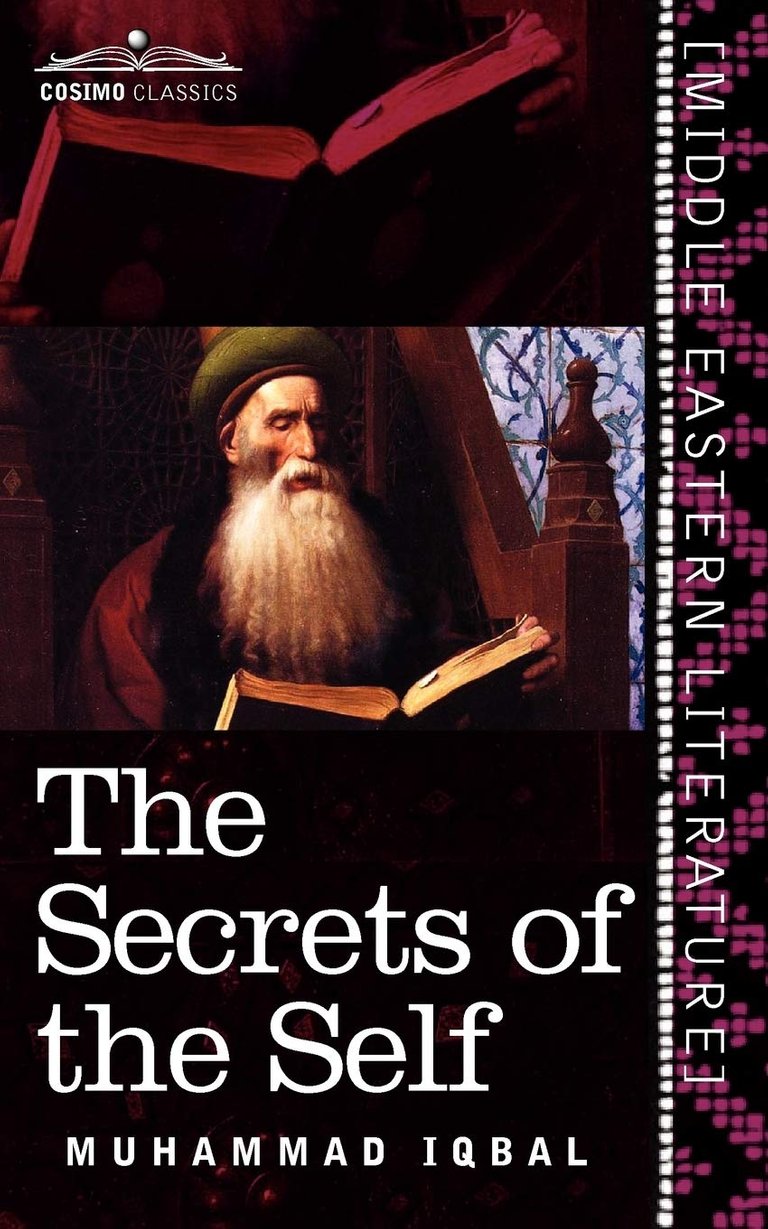
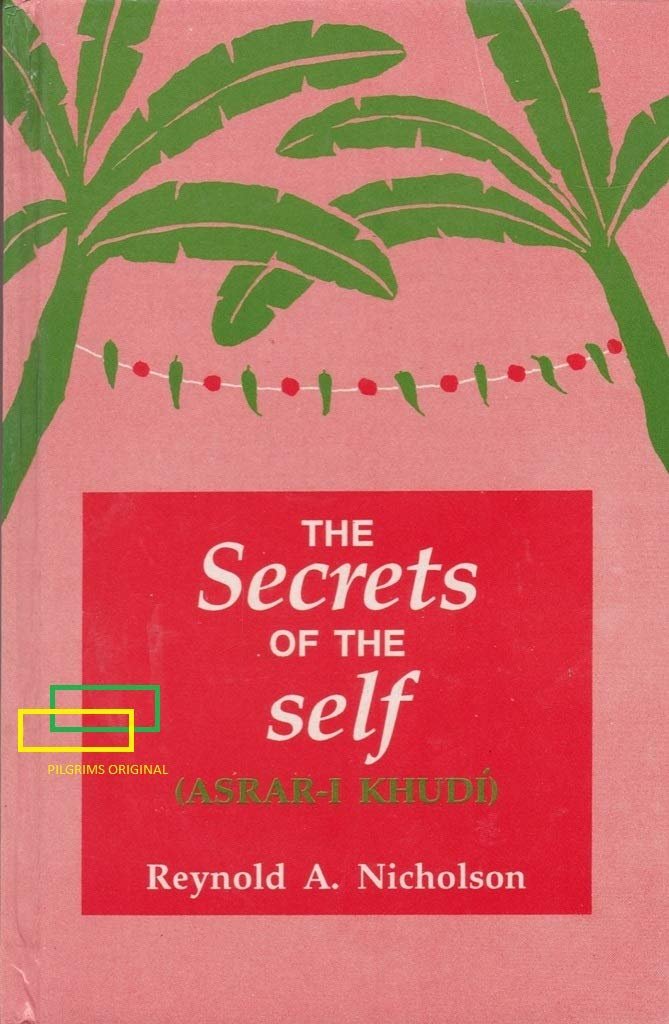
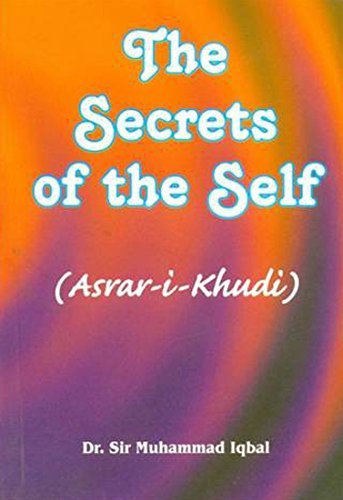
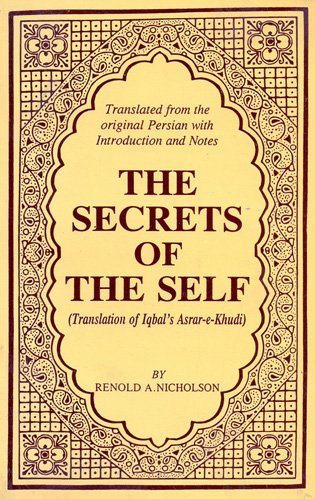
The book is also available in Urdu translation.
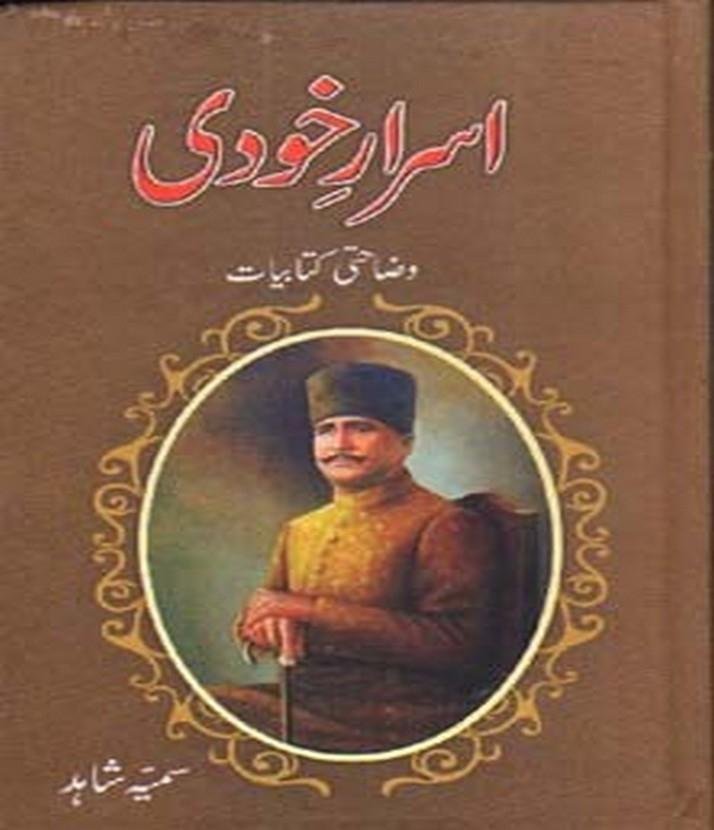
Overview
The poems emphasise the spirit and self from a religious, spiritual perspective. Many critics have called this Iqbal's finest poetic work.
In Asrar-e-Khudi, Iqbal has explained his philosophy of "Khudi," or "Self." Iqbal' s use of term "Khudi" is synonymous with the word of "Rooh" as mentioned in the Quran. "Rooh" is that divine spark which is present in every human being and was present in Adam for which God ordered all of the angels to prostrate in front of Adam.
However, one has to make a great journey of transformation to realize that divine spark which Iqbal calls "Khudi". A similitude of this journey could be understood by the relationship of fragrance and seed. Every seed has the potential for fragrance within it. But to reach its fragrance the seed must go through all the different changes and stages. First breaking out of its shell. Then breaking the ground to come into the light developing roots at the same time. Then fighting against the elements to develop leaves and flowers. Finally reaching its pinnacle by attaining the fragrance that was hidden within it.
In the same way, to reach one's khudi or rooh one needs to go through multiple stages which Iqbal himself went through, spiritual path which he encourages others to travel. He notes that not all seeds reach the level of fragrance. Many die along the way, incomplete. In the same way, only few people could climb this Mount Everest of spirituality, most get consumed along the way by materialism. The same concept had been used by the Medieval poet and philosopher Farid ud-Din Attar of Nishapur in his "Mantaq-ul-Tair" ("The Conference of the Birds").
Iqbal proves by various means that the whole universe obeys the will of the "Self." He condemns self-destruction. For him, the aim of life is self-realization and self-knowledge. He charts the stages through which the "Self" has to pass before finally arriving at its point of perfection, enabling the knower of the "Self" to become the vicegerent of God.
Author's Work In Persian
Iqbal's poetic works are written primarily in Persian rather than Urdu. Among his 12,000 verses of poetry, about 7,000 verses are in Persian. In 1915, he published his first collection of poetry, the Asrar-i-Khudi اسرارِ خودی (Secrets of the Self) in Persian. The poems emphasize the spirit and self from a religious perspective. Many critics have called this Iqbal's finest poetic work.In Asrar-i-Khudi, Iqbal explains his philosophy of "Khudi", or "Self". Iqbal's use of the term "Khudi" is synonymous with the word "Rooh" used in the Quran for a divine spark which is present in every human being, and was said by Iqbal to be present in Adam, for which God ordered all of the angels to prostrate in front of Adam.Iqbal condemns self-destruction. For him, the aim of life is self-realization and self-knowledge. He charts the stages through which the "Self" has to pass before finally arriving at its point of perfection, enabling the knower of the "Self" to become a vice-regent of God.
In his Rumuz-i-Bekhudi رموزِ بیخودی (Hints of Selflessness), Iqbal seeks to prove the Islamic way of life is the best code of conduct for a nation's viability. A person must keep his characteristics intact, he asserts, but once this is achieved, he should sacrifice his ambitions for the needs of the nation. Man cannot realise the "Self" outside of society. Published in 1917, this group of poems has as its main themes the ideal community,Islamic ethical and social principles, and the relationship between the individual and society. Although he supports Islam, Iqbal also recognizes the positive aspects of other religions. Rumuz-i-Bekhudi complements the emphasis on the self in Asrar-e-Khudi and the two collections are often put in the same volume under the title Asrar-i-Rumuz (Hinting Secrets). It is addressed to the world's Muslims.
Iqbal's 1924 publication,the Payam-e-Mashriq پیامِ مشرق (The Message of the East), is closely connected to the West-östlicher Diwan by the German poet Goethe. Goethe bemoans the West having become too materialistic in outlook, and expects the East will provide a message of hope to resuscitate spiritual values. Iqbal styles his work as a reminder to the West of the importance of morality, religion, and civilisation by underlining the need for cultivating feeling, ardor, and dynamism. He asserts that an individual can never aspire to higher dimensions unless he learns of the nature of spirituality.In his first visit to Afghanistan, he presented Payam-e Mashreq to King Amanullah Khan. In it, he admired the uprising of Afghanistan against the British Empire. In 1933, he was officially invited to Afghanistan to join the meetings regarding the establishment of Kabul University.
The Zabur-e-Ajam زبورِ عجم (Persian Psalms), published in 1927, includes the poems "Gulshan-e-Raz-e-Jadeed" ("Garden of New Secrets") and "Bandagi Nama" ("Book of Slavery"). In "Gulshan-e-Raz-e-Jadeed", Iqbal first poses questions, then answers them with the help of ancient and modern insight. "Bandagi Nama" denounces slavery and attempts to explain the spirit behind the fine arts of enslaved societies. Here, as in other books, Iqbal insists on remembering the past, doing well in the present and preparing for the future, while emphasizing love, enthusiasm and energy to fulfill the ideal life.
Iqbal's 1932 work, the Javed Nama جاوید نامہ (Book of Javed), is named after and in a manner addressed to his son, who is featured in the poems. It follows the examples of the works of Ibn Arabi and Dante's The Divine Comedy, through mystical and exaggerated depictions across time. Iqbal depicts himself as Zinda Rud ("A stream full of life") guided by Rumi, "the master", through various heavens and spheres and has the honour of approaching divinity and coming in contact with divine illuminations. In a passage reliving a historical period, Iqbal condemns the Muslims who were instrumental in the defeat and death of Nawab Siraj-ud-Daula of Bengal and Tipu Sultan of Mysore by betraying them for the benefit of the British colonists, and thus delivering their country to the shackles of slavery. In the end, by addressing his son Javed, he speaks to the young people at large, and guides the "new generation".
Pas Chih Bayed Kard Ay Aqwam-e-Sharq پس چہ باید کرد اے اقوامِ شرق includes the poem "Musafir" مسافر ("The Traveller"). Again, Iqbal depicts Rumi as a character and gives an exposition of the mysteries of Islamic laws and Sufi perceptions. Iqbal laments the dissension and disunity among the Indian Muslims as well as Muslim nations. "Musafir" is an account of one of Iqbal's journeys to Afghanistan, in which the Pashtun people are counselled to learn the "secret of Islam" and to "build up the self" within themselves.
Hopefully you will like the book and going to purchase this book for your library.
#drallamaIqbal


